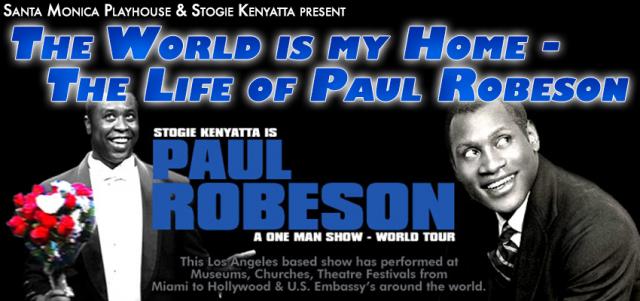
Paul Robeson was one of the most important figures of the 20th century. Actor, singer, scholar, activist, he dominated his era and redefined the black male image. He enjoyed great success until the McCarthy era, when America’s right wing turned on him for his leftist politics. The government not only feared him but hounded and blacklisted him, making it almost impossible for him to make a living in the USA.
Stogie Kenyatta dramatizes these facts in his stirring one-man play, The World is My Home—The Life of Paul Robeson.
Kenyatta has been performing this play for many years in theaters and schools, arranging the bookings on his own, taking the production not just to venues around the USA but to the Caribbean and South America as well. Now, as a way of keeping the show alive in the midst of the pandemic, he is streaming a video of his performance over showclix.com (in collaboration with theaters like the Santa Monica Playhouse).
A big, powerful, dynamic actor, Kenyatta lights up the stage from beginning to end, not just emoting but singing, dancing and reciting Shakespeare (Robeson played Othello on Broadway and in the West End, only the second Black actor to ever perform the role). Kenyatta also has great fun imitating such stars of the Harlem Renaissance as Fats Waller, Cab Calloway, and Ethel Waters.
The fun goes only so far in his life, though. Robeson for the most part had to fight to find success in racist, segregated America. His first job after law school, for example, was in a prestigious New York law firm. He had to soon quit the job because none of the firm’s white secretaries would take dictation from a black man.
As Kenyatta shows, Robeson then opened his own law office and struggled to survive. What saved him from poverty was his voice, a deep dark bass that led to offers to sing and then act professionally.
Kenyatta goes deep into the central aspects of Robeson’s life: the influence his father, a freed slave turned pastor, had on him; attending Rutgers University (where he was not only an All-American football player but Phi Beta Kappa); meeting and marrying his wife. Eslanda; his triumphs in shows like “Othello” and “Showboat;” becoming the most popular, highest-paid concert singer in the world.
Always though he found himself pitted against brutal racists and never felt completely accepted by white society—not until he went to the Soviet Union in 1934, where, as he said, “for the first time in my life I felt like a whole man, a free man!”
Robeson’s love for the Soviet Union is what got him in trouble with McCarthy, J. Edgar Hoover and the other witch-hunters of the 1940s and 50s. Those troubles—being followed, phones tapped, passport taken away from him—affected him grievously, of course. He went broke, turned to drink, had mental problems. Yet, in the end his warrior’s heart carried him through and he never wavered from his conviction that “it is the mission of the artist to save the soul of humanity.”
